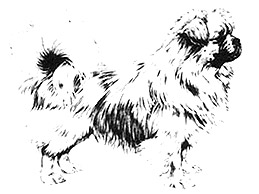Breed standards
Tibetan Spaniel
Breed standards are the official guidelines that describe the ideal characteristics, temperament, and appearance of a breed and ensures that the breed is fit for function with soundness essential.

Pre 1987 Kennel Club, London
Adopted in Australia from 1 January 1998
Should be small, active and alert. The outline should give a well balanced appearance, slightly longer in body than height at withers.
Gay and assertive, highly intelligent, aloof with strangers.
See Characteristics and also under Faults.
Small in proportion to body and proudly carried giving an impression of quality. Masculine in dogs but free from coarseness. Skull slightly domed, moderate width and length. Stop slight but defined. Medium length of muzzle, blunt with cushioning, free from wrinkle. The chin should show some depth and width. Nose: black preferred.
Dark brown in colour, oval in shape, bright and expressive, of medium size, set fairly well apart but forward looking, giving an ape-like expression. Eye rims black.
Medium size, pendant, well feathered in the adult and set fairly high. They may have a slight lift from the skull but should not fly. Large, heavy, low set ears are not typical.
Ideally slightly undershot, the upper incisors fitting neatly inside and touching the lower incisors. Teeth should be evenly placed and the lower jaw wide between the canine tusks. Full dentition desired. A level mouth is permissible providing there is sufficient width and depth of chin to preserve the blunt appearance of muzzle. Teeth must not show when mouth is closed.
Moderately short, strong and well set on. Covered with a mane or 'shawl' of longer hair which is more pronounced in dogs than bitches.
The bones of the forelegs slightly bowed but firm at shoulder. Moderate bone. Shoulder well placed.
Slightly longer from withers to root of tail than the height at withers, well ribbed with good depth, level back.
Well made and strong, hocks well let down and straight when viewed from behind. Stifle well developed, showing moderate angulation.
Harefooted, small and neat with feathering between toes often extending beyond the feet. White markings allowed.
Set high, richly plumed and carried in a gay curl over back when moving. Should not be penalised for dropping tail when standing.
Quick moving, straight, free, positive.
Double coat, silky in texture, smooth on face and front of legs, of moderate length on body, but lying rather flat. Ears and back of forelegs nicely feathered, tail and buttocks well furnished with longer hair. Should not be over coated and bitches tend to carry less coat and mane than dogs.
All colours and mixture of colours, except merle, permissible.
Ideal weight: 4.1 - 6.8 kg (9-15 lbs)
Height: about 25 cms (10 ins)
Any departure from the foregoing points should be considered a fault and the seriousness with which the fault should be regarded should be in exact proportion to its degree and its effect upon the health and welfare of the dog.
Coarseness of type, mean expression Nervousness Very domed or flat, wide skull. Accentuated stop Long, plain down face without stop. Broad, flat muzzle, pointed, weak or wrinkled muzzle. Large, full eyes. Light eye Overshot mouth. Protruding tongue. Very bowed or loose front.
Straight stifle, cow hocks. Cat feet. Liver or putty coloured pigmentation.
Male animals should have two apparently normal testicles fully descended into the scrotum.



